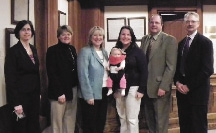On May 10, American Council of Engineering Companies/Massachusetts (ACEC/MA), Boston Society of Civil Engineers Section/ASCE (BSCES), and Massachusetts Association of Land Surveyors and Civil Engineers (MALSCE) members joined together to visit their state legislators at the State House. Association members briefed legislators on issues important to the engineering and land surveying community. This year's Design Professionals Day focused on four issues:
* Transportation Infrastructure;
* Water Infrastructure;
* Fixing the Dam Problem in Massachusetts; and
* Harnessing Private Sector Innovation.
Transportation Infrastructure
The Commonwealth's surface transportation network of highways, bridges, railroads, and transit provides mobility options for moving both goods and people. However, transportation investments are needed to maintain this infrastructure. MassDOT has implemented cost-saving measures while investing into the repair of roads, bridges and transit systems. But reform and cost-savings are not enough to close the gap in the identified needs of the state's transportation network. Not investing in infrastructure now will cost us even more in the future, and will result in loss of economic competitiveness for the Commonwealth.
While the associations did not endorse a specific transportation bill on May 10, we asked legislators to adequately fund infrastructure investment, including the agencies that oversee and permit projects, to create/retain jobs and prevent catastrophic failures.
Water Infrastructure
Many Massachusetts communities have old water and sewer systems in dire need of rehabilitation or replacement. Leaking water pipes drive up treatment costs and increase the risk of breaks. Leaking sewer pipes allow groundwater infiltration, which drives up wastewater treatment costs and negatively impacts groundwater levels. Many communities have water/wastewater treatment plants built in the 1970s now needing significant upgrades that will cost millions. While ARRA funds were available for water and wastewater infrastructure projects through increases in the State Revolving Fund (SRF) over the past two years, these funds are now fully committed and do not meet the needs. Plus, the US EPA Phase II Stormwater program requires many communities to develop plans to treat stormwater discharges, costing millions statewide.
Engineers and land surveyors advocated for several bills that address infrastructure funding: HB 224 [Sponsor: Rep. Dykema]; SB 351 [Sponsor: Sen. Eldridge]; HB 778 [Sponsor: Rep. Mariano] and SB 344 [sponsored by Sen. Creem].
Fixing the Dam Problem in Massachusetts
Approximately 1,680 of 2,900 existing Massachusetts dams pose some level of risk to people and property. More than 56% of all dams are privately owned; individual dam owners are responsible for inspecting and maintaining their own dams. Many public and private dam owners lack funding to perform evaluations or to pay for repairs. There is no incentive to perform evaluations and repairs, as the penalty for not complying with current dam safety regulations is relatively minor compared to the repair cost. In addition, current regulations make it difficult to remove obsolete or unsafe dams.
We requested support for SB 367 - An Act Relative to Dam Repair, Removal and Replacement [Sponsor: Sen. Pacheco], which was reported favorably by the Joint Committee on Environmental, Natural Resources, and Agriculture and referred to the Senate Ways and Means Committee.
Harnessing Private Sector Innovation
Engineering and land surveying firms are key partners in helping state agencies deliver services to taxpayers. From designing solutions to address congestion on roadways, ensuring continued access to safe drinking water, to using green technologies to make industry and government more sustainable. Massachusetts engineering firms are solving public policy challenges and improving the quality of life for residents. In the past, proposed legislation attempted to prohibit the state from benefiting from the talent of private sector firms for construction inspection work, including construction engineering, contract administration, quality control inspection, material testing, and resident engineer and assistant resident engineer functions.
We asked legislators to oppose amendments that would prevent state agencies and municipalities from contracting out for design services and construction phase engineering or testing services from engineering firms. State agencies need the flexibility to determine how they will get this work done.
Professional Engineers, Professional Land Surveyors, and other design professionals are important resources for public policy makers at all levels of government, bringing problem-solving skills, insights and expertise needed by public officials. More information about the issues is available on www.engineers.org
Shown (from left) are: Mary Hall, PE, ACEC/Mass. president-elect (GZA GeoEnvironmental); Lisa Brothers, PE, ACEC/Mass. president (Nitsch Engineering); state senator Karen Spilka; Danielle Spicer, PE, BSCES president (AMEC) with her future engineer daughter; Peter Richardson, PE, BSCES vice president (Green International Affiliates); David Humphrey, PLS, MALSCE president (Schofield Brothers of New England) at Design Professionals Day at the State House, May 10.









.png)